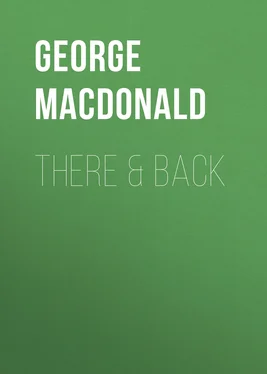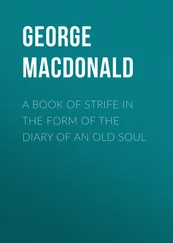George MacDonald - There & Back
Здесь есть возможность читать онлайн «George MacDonald - There & Back» — ознакомительный отрывок электронной книги совершенно бесплатно, а после прочтения отрывка купить полную версию. В некоторых случаях можно слушать аудио, скачать через торрент в формате fb2 и присутствует краткое содержание. Жанр: foreign_prose, foreign_religion, foreign_antique, на английском языке. Описание произведения, (предисловие) а так же отзывы посетителей доступны на портале библиотеки ЛибКат.
- Название:There & Back
- Автор:
- Жанр:
- Год:неизвестен
- ISBN:нет данных
- Рейтинг книги:4 / 5. Голосов: 1
-
Избранное:Добавить в избранное
- Отзывы:
-
Ваша оценка:
- 80
- 1
- 2
- 3
- 4
- 5
There & Back: краткое содержание, описание и аннотация
Предлагаем к чтению аннотацию, описание, краткое содержание или предисловие (зависит от того, что написал сам автор книги «There & Back»). Если вы не нашли необходимую информацию о книге — напишите в комментариях, мы постараемся отыскать её.
There & Back — читать онлайн ознакомительный отрывок
Ниже представлен текст книги, разбитый по страницам. Система сохранения места последней прочитанной страницы, позволяет с удобством читать онлайн бесплатно книгу «There & Back», без необходимости каждый раз заново искать на чём Вы остановились. Поставьте закладку, и сможете в любой момент перейти на страницу, на которой закончили чтение.
Интервал:
Закладка:
“Scorn you, grandfather! God forbid!—or, at least,—”
“You don’t see what I’m drivin’ at, sonny!—When an old tale comes to me from the far-away time, I don’t pitch it into the road, any more’n I would an old key or an old shoe—a horse-shoe, I mean: it was something once, and it may be something again! I hang the one up, and turn the other over. An’ if you be strong set on throwin’ either away, lad, I misdoubt me you an’ me won’t blaze together like one flamin’ sword!”
Richard held his peace. The old man had already somehow impressed him. If he had not, like his father, bid good-bye to superstition, there was in him a power that was not in his father—a power like that he found in his favourite books.
“Mind what he says, and do what he tells you, and you’ll get on splendid!” his mother had said as he came away.
“Don’t be afraid of him, but speak up: he’ll like you the better for it,” his father had counselled. “I should never have married your mother if I’d been afraid of him.”
Richard, trying to follow both counsels, got on with his grandfather better than fairly.
CHAPTER VII. COMPARISONS
All things belong to every man who yields his selfishness, which is his one impoverishment, and draws near to his wealth, which is humanity—not humanity in the abstract, but the humanity of friends and neighbours and all men. Selfishness, I repeat, whether in the form of vanity or greed, is our poverty. John Tuke, being a clever man without a spark of genius, worshipped faculty as he called it—worshipped it where he was most familiar with it—that is, in his own mind and its operations, in his own hands and their handiwork. His natural atmosphere, however, was, happily, goodwill and kindliness: else the scorn of helplessness which sprang from his worship, would have supplied the other pole to his selfishness.
He even cherished unconsciously the feeling that his faculty was a merit. He took the credit of his individual humanity, as if the good working of his brain, the thing he most admired, was attributable to his own will and forethought. The idea had never arisen in that brain, that he was in the world by no creative intent of his own. Nothing had as yet suggested to him that, after all, if he was clever, he could not help it. It had not occurred to him that there was a stage in his history antecedent to his consciousness—a stage in which his pleasure with regard to the next could not have been appealed to, or his consent asked—a stage, for any satisfaction concerning which, his resultant consciousness must repose on a creative will, answerable to itself for his existence. A man’s patent of manhood is, that he can call upon God—not the God of any theology, right or wrong, but the God out of whose heart he came, and in whose heart he is. This is his highest power—that which constitutes his original likeness to God. Had any one tried to wake this idea in Tuke, he would have mocked at the sound of it, never seeing it. The words which represented it he would have thought he understood, but he would never have laid hold of the idea. He found himself what he found himself, and was content with the find; therefore asked no questions as to whence he came—was to himself consequently as if he had come from nowhere—which made it easy for him to imagine that he was going nowhither. He had never reflected that he had not made himself, and that therefore there might be a power somewhere that had called him into being, and had a word to say to him on the matter. The region where he began to be, had never, in speculation or mirage any more than in direct vision, lifted itself above the horizon-line of his consciousness. An ordinarily well-behaved man, with a vague narrow regard for his moral nature, and an admiration of intellectual humanity in the abstract, he thought of himself as exceptionally worthy, and as having neighbours mostly inferior. In relation to Richard, he was specially pleased with himself: had he not, for the sake of the youth, put himself in the danger of the law!
With not much more introspection than his uncle, but with a keener conscience and quicker observation, Richard had early remarked that, notwithstanding her assiduity in church-going, his mother did not seem the happier for her religion: there was a cloud, or seeming cloud, on her forehead—a something that implied the lack of clear weather within. Had he known more he might have attributed it to anxiety about his own future, and the bearing her deed might have upon it. He might have argued that she dreaded the opposition she foresaw to the claim of her nephew; and felt that if her act should have despoiled him of his inheritance, life would be worthless to her. But in truth the cause of her habitual gloom was much deeper. She had from her mother inherited a heavy sense of responsibility, but not the confidence in whose strength her mother had borne it. She had, that is, an oppressive sense of the claims of a supernal power, but no feeling of the relationship which gives those claims, no knowledge of the loving help offered with the presentation of the claims. Where she might have rejoiced in the correlative claims bestowed upon her, she nourished only complaint. That God had made her, she could not sometimes help feeling a liberty he had taken. How could she help it, not knowing him, or the love that gave him both the power and the right to create! She had no window to let in the perpendicular light of heaven; all the light she had was the horizontal light of duty—invaluable, but, ever accompanied by its own shadow of failure, giving neither joy nor hope nor strength. Her husband’s sense of duty was neither so strong nor so uneasy.
She had not attempted to teach Richard more, in the way of religion, than the saying of certain prayers, a ceremony of questionable character; but the boy, dearly loving his mother, and saddened by her lack of spirits, had put things together—amongst the rest, that she was always gloomiest on a Sunday—and concluded that religion was the cause of her misery. This made him ready to welcome the merest hint of its falsehood. Well might the doctrine be false that made such a good woman miserable! He had no opportunity of learning what any vital, that is, obedient believer in the lord of religion, might have to say. Nothing he did hear would, without the reflex of his mother’s unhappiness, have waked in him interest enough for hate: what was there about the heap of ashes he heard called the means of grace, to set him searching in it for seeds of truth! If we consider, then, the dullness of the prophecy, the evident suffering of his mother, and the equally evident though silent contempt of his father, we need not wonder that Richard grew up in what seemed to him a conviction that religion was worse than a thing of nought, was an evil phantom, with a terrible power to blight; a miasm that had steamed up from the foul marshes of the world, before man was at home in it, or yet acquainted with the beneficent laws of Nature. It was not merely a hopeless task to pray to a power which could not be entreated, because it did not exist; to believe in what was not, must be ruinous to the nature that so believed! He would give the lie no quarter! The best thing to do for his fellow, the first thing to be done before anything else could be done, was to deliver him from this dragon called Faith—the more fearful that it had no life, but owed its being and strength to the falsehood of cowards! Had he known more of the working of what is falsely called religion, he would have been yet more eager to destroy it. But he knew something of the tares only; he knew nothing of the wheat among the tares; knew nothing of the wintry gleams of comfort shed on thousands of hearts by the most poverty-stricken belief in the merest and faultiest silhouette of a God. What a mission it would be, he thought, to deliver human hearts from the vampyre that, sucking away the very essence of life, kept fanning its unconscious victims with the promise of a dreary existence beyond the grave, secured by self-immolation on the desolate altar of an unlovable God, who yet called himself Love ! Was it not a high emprise to rescue men from the incubus of such a misimagined divinity?
Читать дальшеИнтервал:
Закладка:
Похожие книги на «There & Back»
Представляем Вашему вниманию похожие книги на «There & Back» списком для выбора. Мы отобрали схожую по названию и смыслу литературу в надежде предоставить читателям больше вариантов отыскать новые, интересные, ещё непрочитанные произведения.
Обсуждение, отзывы о книге «There & Back» и просто собственные мнения читателей. Оставьте ваши комментарии, напишите, что Вы думаете о произведении, его смысле или главных героях. Укажите что конкретно понравилось, а что нет, и почему Вы так считаете.












